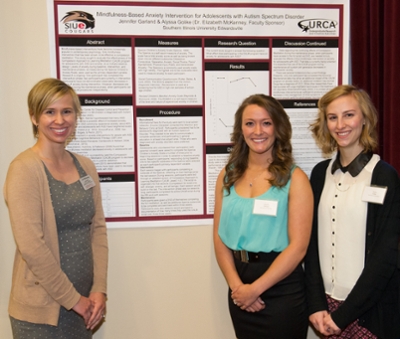
Stop, take a deep breath, recite a positive, soothing mantra, repeat – it’s a behavioral pattern that researchers at Southern Illinois University Edwardsville hope may reduce heightened levels of anxiety among adolescents with Autism Spectrum Disorder (ASD). Statistics show approximately 40 percent of children with ASD experience high levels of the emotion.
Elizabeth McKenney, assistant professor of psychology at SIUE, and Undergraduate Research & Creative Activities (URCA) Assistants, senior Alyssa Golike of Jerseyville, and junior Jennifer Garland of Effingham, are studying whether the Compassion Approach to Learning Meditation (CALM) program is effective in diminishing anxiety among this particular population.
SIUE’s Professor Jeremy Jewell, Clinical Child and School Psychology Program director, first adapted compassion meditation procedures into the CALM program. He has used it to target anxiety, aggression and other emotions among adolescents in settings such as juvenile detention.
Never before have researchers considered the effects of the program on anxiety, specifically among adolescents with ASD. Together Jewell and McKenney adapted the program for that target population.
“Many situations induce anxiety, particularly among individuals with ASD,” said Golike. “It is often more difficult for them to understand certain social situations, making them feel uncomfortable or awkward. It can be overwhelming when you don’t know the emotions at play, or how to respond.”
“This intervention targets the ability to relax,” McKenney explained. “It targets the ability to engage in having compassion in order to calm down.”
Participants go through six sessions where researchers lead them through a script. The compassion based meditation script engages participants in deep breathing while they listen to a core saying: May you have happiness. May you be free from suffering, and may you experience joy and ease.
“Specific parts of the script offer a way to distract and divert certain thoughts,” explained Golike. “They’re aimed at helping an adolescent with ASD calm down, especially when he or she is having a lot of repetitive thoughts, or is feeling panicked.”
With each session, the CALM program teaches compassion, first for a loved one, then one’s self, a stranger, an enemy, and finally, all beings.
At the final session, participants are sent home with a DVD that they are encouraged to use on their own when they experience feelings of anxiety. They are asked to use a number of rating scales to indicate how often they use the DVD, and how they are feeling in terms of their anxiety symptoms.
Collecting that information will be an important step toward determining whether the CALM program is indeed an effective intervention for adolescents with ASD.
“The whole point is to have them use this method in their every day lives, and learn how to deal with and reduce their anxiety,” Garland added. “Our maintenance data should show how much they’ve worked independently, and hopefully, their levels of anxiety decrease.”
The researchers expect to have their first set of final results within the month.
“This is cutting-edge research,” said McKenney. “Working with undergraduate assistants is highly valued at SIUE. It is a big part of how we teach, especially the psychology department. Getting to work with real data and participants is a unique skill that not all undergraduates are exposed to.”
The URCA Program at SIUE encourages, supports and enables students to participate in research at the undergraduate level. URCA Assistants spend approximately nine hours per week under the direct guidance of a full time tenured or tenure-track faculty member on projects directly related to their research.
Photo: Researchers (L-R) Dr. Elizabeth McKenney, assistant professor of psychology, Jennifer Garland, junior psychology student, and Alyssa Golike, senior psychology student present their preliminary findings at SIUE’s URCA Symposium.